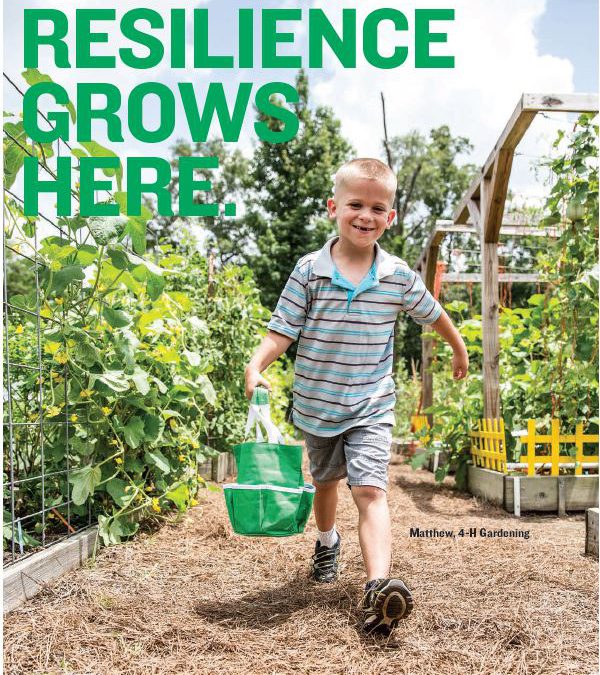
by Jena Gilmore | Mar 27, 2020
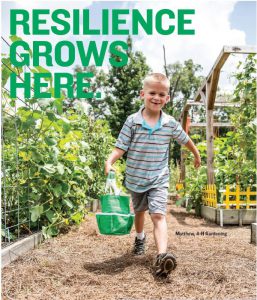 4-H is known for creating safe and inclusive environments. Many may argue this could be incredibly difficult now in the wake of the Coronavirus sweeping Florida, however, where some may see resistance, 4-H shows our resiliency. Across Florida, 4-H Agents have been brainstorming a multitude of ways to continue serving their clientele and practicing what we pledge by…
4-H is known for creating safe and inclusive environments. Many may argue this could be incredibly difficult now in the wake of the Coronavirus sweeping Florida, however, where some may see resistance, 4-H shows our resiliency. Across Florida, 4-H Agents have been brainstorming a multitude of ways to continue serving their clientele and practicing what we pledge by…
”My Head to clearer thinking, my Heart to greater loyalty, my Hands to larger service and my Health to better living, for my Club, my Community, my Country, and my World.
Within the Northwest District, there are currently many alternative programs to engage our 4-H members and volunteers during this time of “social distancing.” Interactive meetings, webinars, and interviews are provided through online streaming platforms that allow members to call in or connect via their smartphones, tablets and computers. Other alternatives include utilizing Youtube Channels or Facebook to stream recorded videos of activities for youth and adults. Consider exploring some of our many options below and join us on our new virtual adventure in experiential learning 4-H style!
Virtual Opportunities for Youth
Embryology, which is typically delivered as a school enrichment program, can now be viewed live on some county 4-H websites and Facebook pages. Agents and 4-H volunteers are also offering virtual livestock judging options so judging teams can continue to build their knowledge base for competitions along with Virtual Farm Tours in some areas. Other counties are banding together to deliver daily activities for youth via recorded series posted on their Facebook pages that highlight different themed days of the week.
- Escambia County 4-H Virtual Embryology Experience
- Register via their Eventbrite for full access to videos, webinars and resources
- 4-H Life Skills Masters Daily Series via Holmes & Walton 4-H County Facebook Pages
- Daily themes with activities include: Make It Mondays, Tasty Tuesdays, Water Wednesdays, Tackle It Thursdays & Fitness Fridays
- Washington County 4-H Project Showcase via Flipgrid
- Compete within your 4-H Showcase project area virtually with Mrs. Julie
- Jackson County Virtual Poultry Judging
- Jackson County Agriculture Virtual Day Camps
- This series is posted on their Facebook page and can be reviewed even after the event!
- Freezer & Fridge hacks with Calhoun County 4-H
- Learn tricks and tips of preserving all those extra groceries during your COVID-19 prep
- Liberty County 4-H detEGGtives investigate the 21-day countdown to Hatching with my Peeps
- Wakulla County 4-H shares Facebook Live daily updates and content from across Florida 4-H
- Leon County 4-H takes you on a virtual farm tour!
- Leon County 4-H Virtual Showcase
- Compete virtually and potentially win cash prizes for your clubs along with individual prizes and recognition…WIN:WIN!
Virtual Opportunities for Volunteers
Volunteer based programming has shifted to virtual as well! Currently, each month a webinar is hosted which highlights different topic areas related to delivering a well balanced 4-H program to your club members. Topics so far have included Preparing for County Showcase (aka County Events), Professional 4-H Portfolio Tips, and 4-H Project and Record Book Tips. You can register for the Virtual Volunteer Leadership Academy through our Eventbrite link and receive calendar invitations, reminders, and links so you can tune in LIVE or watch the recorded sessions later. Our team also provides you with all the resources discussed in each section. Registration is required and can be found at http://bit.ly/4HVVLA
4-H Virtual Volunteer Leadership Academy
- April- Awards & Recognition
- September*- Judging Contests
- October*- Preparing for Exhibits & Shows
*Fall session registration will be available July 1, 2020.
Subscribe to our NW District YouTube Channel for recorded sessions
If you would like to learn more about the 4-H opportunities available in your county, please contact your local UF IFAS County Extension Office, or visit http://florida4h.org. Now is a great time to join the 4-H family!
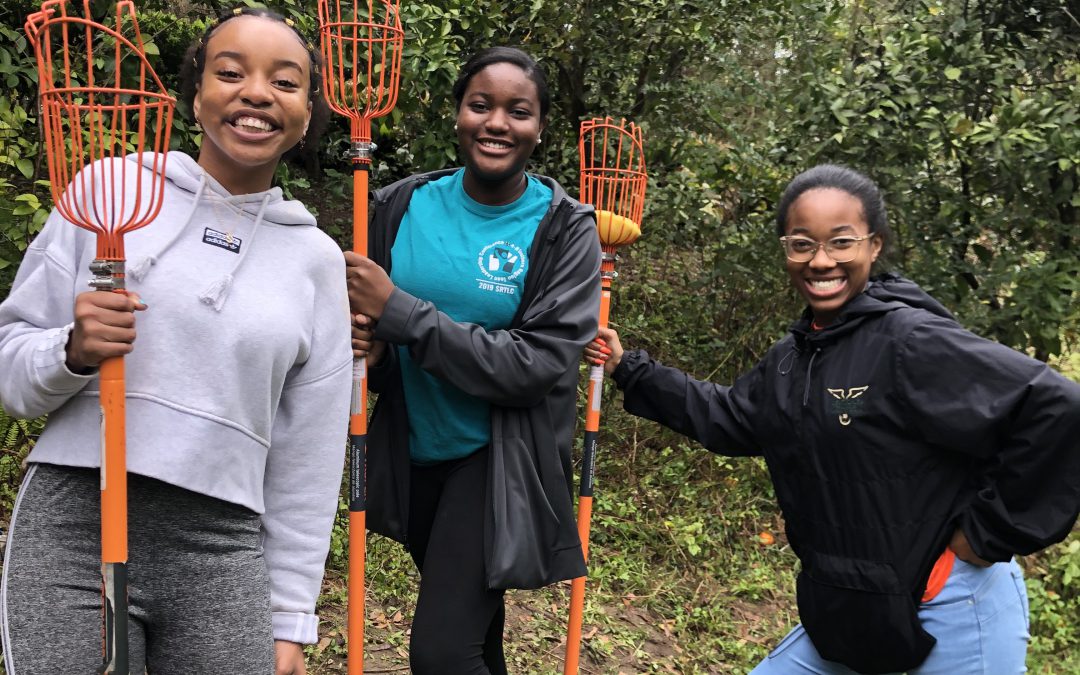
by Allison Leo | Mar 20, 2020

Valentines Day Cards for the Tallahassee Senior Center
From participating in a park clean up to sewing dog beds for the local animal shelter, many 4-H members are actively involved in community service projects as part of their 4-H club experience. 4-H members pledge their hands to larger service, making community service an important part of club membership. 4-H has historically given back to the community by encouraging young people and adults to volunteer. Giving back to the community allows members to learn the value of helping others, develop leadership and communication skills, feel empowered, grow their decision-making skills, and much more.
But, are these members involved in service-learning? What is the difference between a community service project and service-learning? How can you turn a club community service project into service-learning?
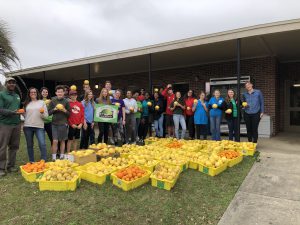
Leon Camp Counselors collected over 1,300 lbs of produce.
COMMUNITY SERVICE
Community service is work done by an individual or group that benefits others. This work is typically done in your own community, to directly benefit the members in your community. Examples of this type of service are conducting food drives, planting a community garden, creating holiday cards for nursing home residents, or helping serve meals at a shelter.
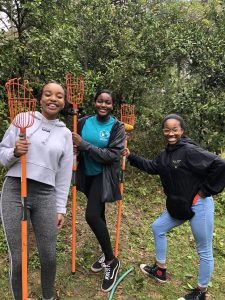
Leon teens took a break from gleaning to pose for a picture.
SERVICE-LEARNING
Compared to community service projects, service-learning is a method of teaching youth that fosters a deeper connection to the project. Service-learning merges a meaningful community service project with purposeful learning and reflection. Here’s an example: if youth serve lunch to veterans, they are providing a service to the community and that is considered a community service project. For that same project to become a service-learning project, additional learning and reflection opportunities are included. Youth would be involved in the planning process and would work together to select the service-learning project based on the needs of a community. Before serving lunch to the veterans, youth could learn about the challenges and issues facing veterans in the community from a guest speaker or they could conduct research independently to present at a club meeting. After the project, youth reflect on the experience of serving lunch to the veterans and share any feedback or results with the community.
Successful Service-Learning Projects Include Four Steps:
Step 1: Assess
Club members work together to identify and assess needs in their community. Youth can have a brainstorming session or take a club field trip to assess needs in-person. After identifying multiple needs, club members will take a vote on the best option for their service-learning project.
Step 2: Plan
This step will take the most time. It is important to schedule the appropriate amount of time to plan the project. This can occur during a club meeting for small projects or over the course of multiple meetings for larger projects. Use the information gathered during step 1 to develop a plan, timeline, list of supplies and roles and responsibilities for each team member. It is a good idea to identify potential problems that might occur. Safety and risk management procedures will need to be addressed during this step. Club volunteers can guide this youth-led process, but it is important to let club members take the lead in planning.
Step 3: Conduct Service Project
Time to complete your service project! The day of service is rewarding and exciting. Make sure you have the supplies needed and roles are assigned appropriately.
Step 4: Reflection
During and after the service project, it is important to pose reflection questions to the group and individuals. This allows youth to think about their project and draw a connection to the bigger picture. Why is the service being completed important? What have you learned from it? Has it taught you a new skill or changed your mindset about something? Most importantly, now that you have learned from the project, what are you going to with your new knowledge? Reflection can be through group discussion, journal writing, photographs, or multimedia presentations.
For more information on service-learning projects or other 4-H programs that build essential life skills in youth, please contact your local UF IFAS County Extension Office, or visit http://florida4h.org.
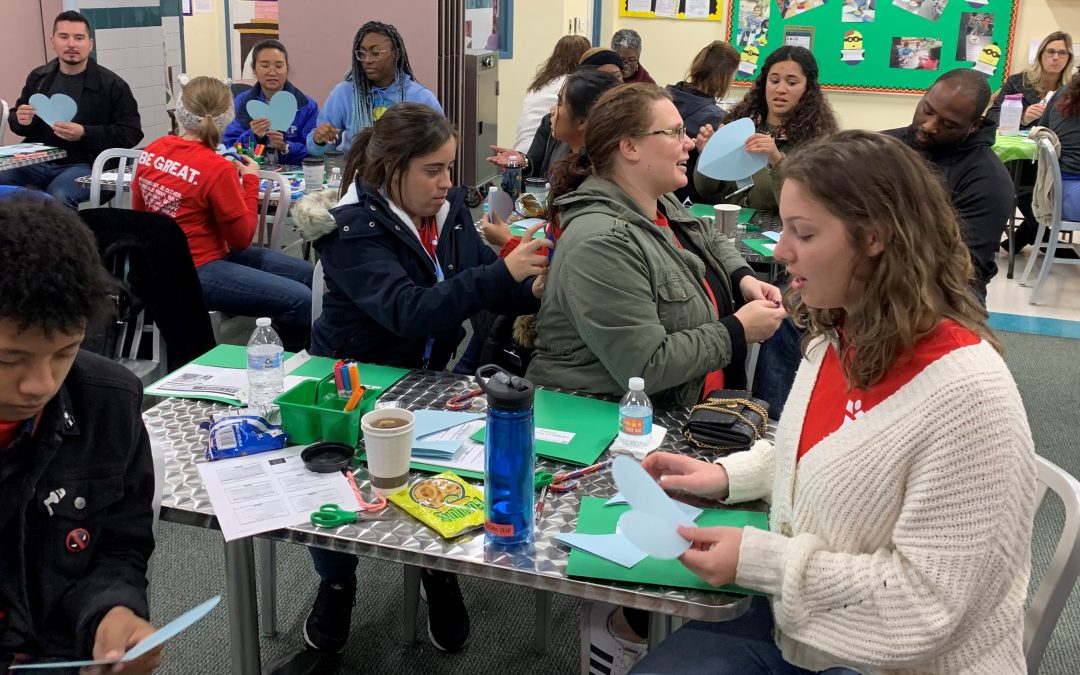
by pmdavis | Mar 6, 2020
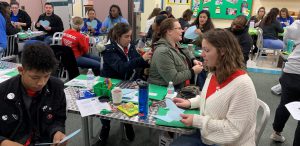
4-H Volunteer Training about healthy relationships!
Make 2020 the year you learn something new or share your talents with a young person in your community. 4-H, the nation’s largest youth development and empowerment organization, cultivates confident youth who tackle the issues that matter most in their communities. It allows youth to learn by doing. 4-H relies on screened, dedicated volunteers to promote its mission to help youth gain the knowledge and life skills they need to be productive, responsible citizens.
In the Florida Panhandle, we have 4-H programs in schools, afterschool settings, and on military bases where we provide curricula and training to enhance our youth experiences while being active in 4-H. We also have school enrichment programs offering youth 4-H experiences on a specific subject while in school. We have community clubs and special interest groups that are currently active and we need more caring compassionate adults to help! These opportunities are great for families to do together.
If you only have time for a short-term event and like sewing, grilling, cake decorating, gardening or love bugs and outdoor education, consider volunteering. Contact your local Extension Office to see what spring and summer workshops and day camps are being offered that need caring adults to act in the role of 4-H volunteers. Your time as a volunteer will provide our youth the safe place to pursue whatever interests, causes, and leadership roles are most important to them. It also allows you to learn from the youth about current trends, fashions and technology. It really is a two-way learning opportunity where all involved learn by doing.
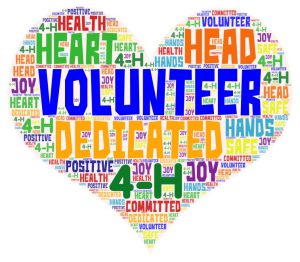
To volunteer, even for the summer workshops, you will need to be screened and trained, so contact us now. The screening and training process takes a little time. Please considervolunteering in your community. With over 70 different 4-H project areas from money and finances, gardening to computer science and rocketry, there are plenty of areas to work with youth to share your knowledge and skills. Please consider helping us live up to our motto of “making the best better” with 4-H by volunteering today. Simply contact your local extension office or check out our website for more information.
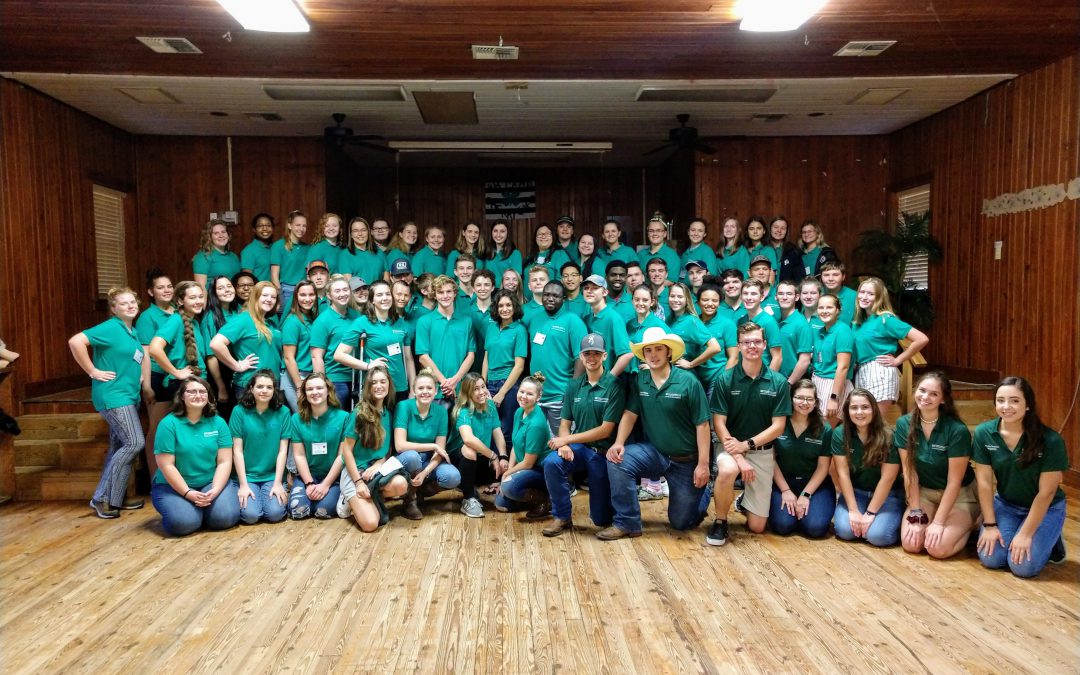
by Niki Crawson | Jan 17, 2020
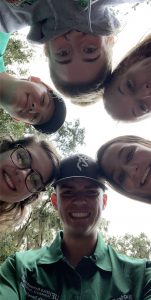
Executive Board members putting their heads together to make the best better!
4-H Agents and long-term 4-H members are often asked, “What exactly is Florida 4-H State Executive Board?” So what better way to get the best clarification than to get it straight from the source. I turned to Shelby Sumner, our Florida 4-H State Council Reporter, to give us the best inside scoop…Here is Shelby’s reply:
Executive Board is a committee composed of 4 delegates from each of the 13 4-H Districts, as well as up to 30 Executive Board appointees, and the 8 Florida 4-H State Officers. The Executive Board members meet 3 times each year to work together to plan state events, and to work in their respective standing committees.
STANDING COMMITTEES
The standing committees include Entertainment, Communications and Council Support, State Project, and Ways and Means. Entertainment works to provide entertaining activities at the State Executive Board meetings; Communications and Council Support assists with the promoting of different State 4-H events and opportunities available; State Project plans and implements a statewide community service project; Ways and Means is responsible for fundraising for the Florida 4-H State Council.
EVENT COMMITTEES
Similar to the standing committees, there are 4 event committees on Executive Board as well. These include 4-H Legislature, 4-H University, Day at the Capital, and Intermediate State. Executive Board members play a vital role in the planning and implementation of these state events by providing input into our state events during their working committee meetings at Executive Board Weekends, and helping throughout the course of the event itself.

Executive Board Weekend
A SECOND FAMILY
While the work that Executive Board members put in throughout the year is obviously an important component of Executive Board, it does not encompass what I believe to be the best part: the second family that it gives you. Laura Manzueta, a Miami-Dade County Executive Board Member, described what Executive Board means to her, stating, “To me, Executive Board means a family of youth that are responsible, care about the community, and are going to change the world.”

Members at Executive Board working together to plan great things.
LIFE CHANGING EXPERIENCES
Additionally, Executive Board gives youth life-changing experiences and connections that help them to grow as individuals. “Executive Board has shown me that surrounding yourself with people you look up to, helps to make you a better person.”-Daylyn Hutchinson, St. Lucie County Executive Board Member.
AN OPPORTUNITY FOR NON-EXECUTIVE MEMBERS
Third Executive Board provides an opportunity for non-Executive Board members (4-H ages 14-18) to get a feel for what Executive Board is like, by taking part in activities such as the State Project activity, and they have chances to observe standing and event committee meetings. Third Executive Board will be held at 4-H Camp Cherry Lake in Madison, FL, on April 3-5, 2020. The cost for non-Executive Board Members is $120, and $115 for Executive Board Members. Registration for this event opens on 4-H Online on March 9, 2019 and closes March 27, 2019.
Between the various learning and leadership opportunities, and the chances of meeting new best friends, becoming an Executive Board member is one of the greatest decisions that a 4-Her can make, and attending Third Executive Board is the perfect way to learn more about this endeavor. So, don’t miss out on an amazing weekend, and make sure to attend Third Executive Board in April!
For more information on Executive Board or other 4-H programs, please contact your local UF IFAS County Extension Office, or visit http://florida4h.org.
Special thanks to Shelby Sumner, Florida 4-H State Council Reporter, for providing this article, and Courtney Quirie, Florida, 4-H Events Coordinator, for providing the pictures.
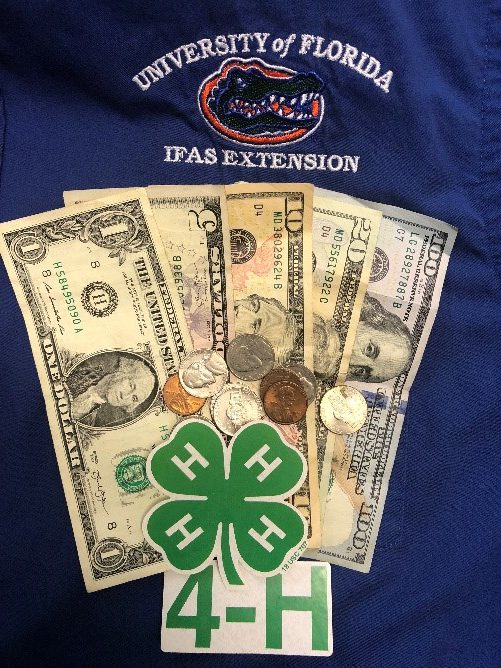
by pmdavis | Jan 10, 2020
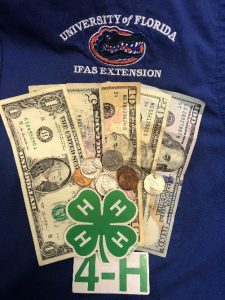
Are you financially savvy?
As a parent, I worry about children and their money habits! They often have trouble distinguishing between a need and a want. I often wonder if I am empowering them to be financially savvy. I know this is a topic that I continually work on for myself. It is important to start teaching healthy money habits early! It is also important for children to hear about personal finance to understand how money works in a variety of settings: home, school, and youth organizations. I know my children receive money as gifts and it tends to “burn a hole in their pocket” until it is gone. Like adults, children need to practice making “healthy financial” decisions so that those decisions become “healthy habits,” reducing stress in their lives.
With Valentine’s Day right around the corner, you might think of helping your children or grandchildren start a savings account to provide some financial security for the future. Then, encourage them to keep adding 10-20% of any money they receive to the account for a rainy day or that big purchase they desire.
RESOURCES AVAILABLE
Extension and 4-H have several publications and project books that provide guidance in the area of personal finance on spending, saving, investing, and donating. These projects can be done in a group setting or as a self-study project. National 4-H Curricula include “Financial Champions 1: Money FUNdamentals.” This piece has activities allowing kids to develop a money personality profile and style, understand the difference in needs and wants, make informed money decisions, set financial goals, and develop a money plan.
“Financial Champions 2: Money Moves” allows kids to learn how to predict outcomes and analyze their finances. They calculate interest; determine the cost of credit; learn how to manage a checking account, explore selecting financial services, make informed marketplace decisions and discover ways of handling money. National 4-H also has free curricula you can download for older youth.
UF/IFAS Extension also has free resources about money and financial management for adults and families on a wide range of topics such as Consumer Rights, Credit and DebtManagement, End of Life Issues, Finance and Family, Personal Finances Insurance, Retirement Planning, and Saving and Investing. University of Maryland 4-H also has a program called Financial Nuggets. This is a free download giving ideas on how to teach financial decision making to youth. It is designed for family involvement. Therefore families will increase their basic financial capacity and ability to make both short-and long-term decisions regarding spending and saving. It explores topics like needs verses wants, planning and managing money using a budget, how wealth is created and built, and managing risks.
Extension and 4-H want to encourage children, teens, and families to learn about personal finance, to practice what they learn and to teach others. We really want to get 4-H members and their families on the road to being money smart consumers. For more information on financial education and tools to help you become financially savvy or get out of debt, contact your local UF/IFAS County Extension Office, or visit http://florida4h.org. 4-H is one of the nation’s most diverse organizations and includes people from all economic, racial, social, political, and geographic categories. There are no barriers to participation by any young person. Participants are given the opportunity to engage in activities that hold their personal interest, while being guided by adult volunteers. If you are interested in volunteering, please contact your local office.
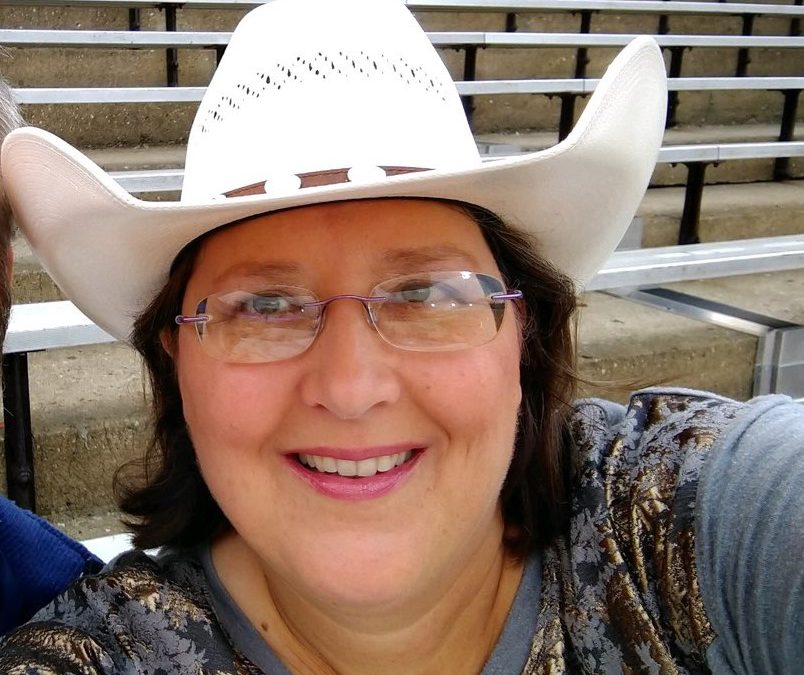
by Jena Gilmore | Nov 15, 2019
November is National Role Model Month
4-H Volunteer Dedication: A Decade and Counting
4-H volunteers are the vital precious gems of our 4-H programs. Each volunteer brings his/her own unique perspective, skills, and resources to the club or event they are working in. Whether a volunteer’s role is long-term as a 4-H Club Leader, or short-term as an episodic volunteer, they each donate an immense number of hours annually to ensure the youth of our Nation receive the best positive youth development opportunities.
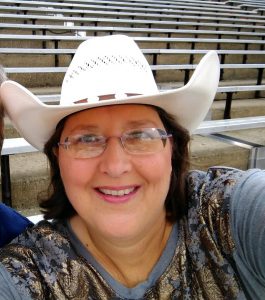
Missy attending graduation at UF
Walton County 4-H is extremely fortunate to have a 4-H Club Leader that has dedicated 12 years to her Naturally Balanced Homesteading Club. Missy Bolen had only attended two club meetings as a youth because she didn’t have a project horse to be able to fully participate in club activities. This may have been the initial spark that led Missy to develop her own 4-H club decades later, in which youth get the opportunity to experience a broad spectrum of activities. Within Naturally Balanced Homesteading, a homeschool (in-school) club, youth have completed projects and demonstrations in leather working, gardening, sheep shearing, leadership training, conservation, and numerous educational field trips to name a few. Due to Missy’s passion towards 4-H, she currently has the largest club in our county, with more than 30 youth in attendance each month!
As a veteran 4-H volunteer and Club Leader, Missy’s advice to new volunteers is, “If you have a passion for youth and there isn’t a club already established, follow that passion; start a club and try to reach as many youth as you can! If you’re doing something that you’re passionate about, you won’t get bored and you will remain energetic and enthusiastic.”
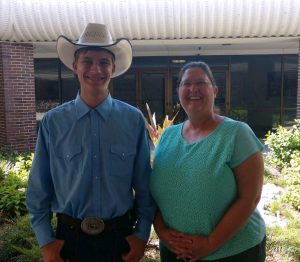
Missy and son, Jesse, attending Bee College at UF
Volunteering in 4-H gives you the opportunity to be a role model to upcoming generations by providing them with activities and resources that target development of life skills. The life skills youth gain in 4-H programs afford them the foundation to build on as they become productive adults in society. When asking Missy to share the most rewarding part of being a volunteer, and what keeps her going after 12 years, she states, “My children are a huge factor because they have a club where they can do what they love alongside other youth with the same interests. It’s very rewarding to see them graduate, go on to great universities, and become productive adults! They recognize 4-H as the main reason for their accomplishments because many of their most valuable skills were developed through their clubs such as social skills, leadership skills, networking and confidence.”
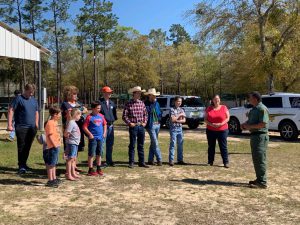
Missy’s club learning about careers in Law Enforcement.
Volunteers are truly the HEAD, HEART, HANDS, and HEALTH of the 4-H organization. As Missy would say, “Most importantly, you must keep your focus on one thing: It’s all about helping the children.” If you are a new or current volunteer, club leader, or even 4-H Agent, the resources below are an excellent source of information as an orientation to 4-H or an annual refresher:
· Volunteer Orientation
· Volunteer Resources
· Volunteer Training Series
If you would like to learn more about how to get involved as a 4-H volunteer in your 4-H community, please contact your local UF IFAS County Extension Office, or visit http://florida4h.org

 4-H is known for creating safe and inclusive environments. Many may argue this could be incredibly difficult now in the wake of the Coronavirus sweeping Florida, however, where some may see resistance, 4-H shows our resiliency. Across Florida, 4-H Agents have been brainstorming a multitude of ways to continue serving their clientele and practicing what we pledge by…
4-H is known for creating safe and inclusive environments. Many may argue this could be incredibly difficult now in the wake of the Coronavirus sweeping Florida, however, where some may see resistance, 4-H shows our resiliency. Across Florida, 4-H Agents have been brainstorming a multitude of ways to continue serving their clientele and practicing what we pledge by…
















